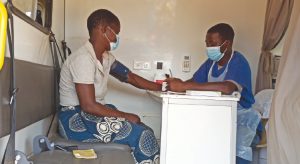At the age of 19, Memory Mkaka from Traditional Authority Chimutu in Lilongwe was impregnated by a young man who denied responsibility.
She sought in her parent’s house who agreed to take care ofthe pregnancy until she delivered.
Says Mkaka: “I was in Form Two when, as a result of peer pressure, I started dating a fellow student who was a class ahead. A few months later, I fell pregnant.”
She describes it as a devastating moment in her life as she felt her parents would no longer trust her.
Says Mkaka: “It was like betrayal. My parents believed in me, but instead of working hard in class, I fell pregnant. I thought of killing myself but being with friends helped me to stop thinking about suicide.”
Agirl being helped at one of the mobile clinics
She then joined M’gwazamaya Youth Club in her area where youths discuss issues of sexual reproductive health and rights (SRHR).
Says Mkaka: “When we gather, we enlighten one another on the importance of taking care of our lives as well as living our dreams.
“Since I joined the group, I stopped blaming myself for what happened and when my child was born, I returned to school.”
Currently, she is in Form Four and remains a vibrant member of the youth club. She chose to start using condoms as a contraceptive method.
Mkaka says: “Being a youth club member has opened my eyes. I have learnt things I never expected to know. If it were not for the group, I would have been a mother of two by now.”
She also says the knowledge gap that exists among the youth on SRHR issues remain one reason fuelling teenage pregnancies and child marriages.
According to the 2015-2020 Youth Friendly Health Services strategy, women constitute about 52 percent of Malawi’s population. However, girls continue to be susceptible to high levels of vulnerability, risk and deprivation on SRHR and HIV-related issues.
Various civil society organisations (CSOs) that deal with issues of SRHR in the country say having inadequate resources to fund SRHR service has led to slow adoption, especially in hard-to-reach areas.
According to Foundation for Civic Education and Social Empowerment advocacy coordinator Prisca Kunsida the funds are not enough as the country has a lot of problems concerning SRHR.
She says: “We talk of supplies, information sharing and access to services. All these require enough resources to materialise. In fact, funds will never be enough as there are always new issues arising.”
Kunsida adds that inadequate supply of contraceptives in some hospitals has forced women to use contraceptive methods they do not prefer.
She says: “For example, if a woman prefers intrauterine device [IUD] and it is not available at a health facility, they settle for the available method like condoms or pills which is not what is supposed to be happening.
“Again, because of inadequate supply of contraceptives in some facilities, priority is given to older married women and not adolescent girls and young women.”
Kunsinda says this has led to increased number of teenage and unwanted pregnancies and that because of inadequate information on SRHR and misconceptions on contraceptives, uptake is not that appeasing.
Family Planning Association of Malawi (Fpam) communications and advocacy officer Faith Kadzanja says as one way of promoting family planning, they are currently undertaking several initiatives targeting adolescent girls and young women, including those in hard-to-reach areas with modern family planning methods.
She says: “One such initiative is having mobile outreach clinics across the country. Our outreach teams provide family planning methods to people during such interventions on a daily basis for free.
“The aim is to ensure child spacing and manage population growth.”
Kadzanja adds that such efforts are hindered by many factors, including myths and misconceptions about family planning as well as culture.
“Some people are afraid of accessing modern contraception methods because of such myths, thereby hindering progress. But we continue working with local structures to ensure that people understand the importance of using modern contraceptives,” she adds.
SRHR Africa Trust country director Robert Mangwazu Phiri says engaging relevant stakeholders is helping to shape agendas and policies on SRHR.
He says: “CSOs continue to play significant roles in making sure that SRHR service provision improves. Young people continue falling pregnant and getting married at a tender age. But as a nation we have laws that do not allow child marriages and that leaves us with a huge responsibility.”
Phiri adds that there is a need for laws to be implemented and also empower young people economically as poverty is one reason why most young people are becoming victims of teenage pregnancy and child marriage.
The 2022-2023 financial year however, allocated about K400 million compared to the K200 million in the previous year to the SRHR sector which CSOs have hailed but caution on the need to utilise the resources rightly.
According to the 2015-2016 Malawi Demographic Health Survey, the unmet need for family planning methods for sexually active unmarried people is at 84 percent with only 53 percent of the demand being satisfied and that there are 54.2 percent unintended pregnancies among women in Malawi.
The post Promoting women, youth’s reproductive health rights appeared first on The Nation Online.
 Moni Malawi
Moni Malawi 
